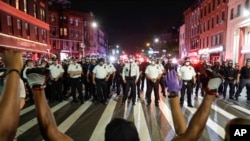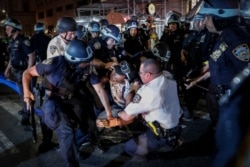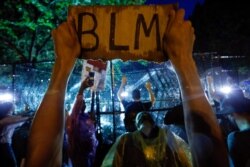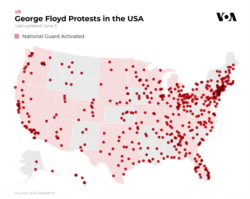Protests following the death of George Floyd, an African American man who died in police custody in Minneapolis, Minnesota, were largely peaceful in U.S. major cities Thursday evening, and fewer incidents of violence were reported.
Unlike previous days’ demonstrations, protest intensity was subdued, including in New York, where demonstrations lasted beyond an 8 p.m. curfew, and in Washington.
Washington Mayor Muriel Bowser said the city’s curfew was being lifted, although it was not clear from her statement whether the change would be permanent.
Military police and law enforcement units from several federal agencies have been out in force in Washington, and their presence has been a source of friction between city officials and the federal government.
"Obviously, the very first thing is we want the military, we want troops from out of state, out of Washington, D.C.," Bowser said.
City officials have demanded that the federal response to the protests not extend beyond the area around the White House and adjacent Lafayette Square.
National Guard
Two National Guardsmen were hurt in Washington on Thursday night during thunderstorms and heavy rain after a lightning strike in Lafayette Park, close to the White House, The Washington Post reported.
The guardsmen were taken to a hospital nearby with serious injuries, but according to a spokesman for the city fire department, the injuries were not life-threatening.
No injuries to the hundreds of protesters congregated there were reported.
A large protest is expected in Washington on Saturday.
George Floyd memorial service
Earlier Thursday, Floyd was remembered as a devoted father and family man in Minneapolis, in the first of several memorial services, where civil rights leader the Rev. Al Sharpton made an appeal to all Americans, with a reference to the white police officer kneeling on Floyd's neck as he cried out that he could not breathe.
Thursday’s service in Minneapolis included civil rights activist Jesse Jackson, Minnesota Senator Amy Klobuchar, several members of Congress, and celebrities, including Ludacris, Kevin Hart, Tiffany Haddish, and T.I.
At one point, the audience at the sanctuary at North Central University stood in silence for eight minutes and 46 seconds — the length of time white police officer Derek Chauvin knelt on Floyd’s neck.
“George Floyd’s story has been the story of black folks. Because ever since 401 years ago, the reason we could never be who we wanted and dreamed to be is you kept your knee on our neck,” Sharpton said in his eulogy. “It’s time for us to stand up in George’s name and say, ‘Get your knee off our necks!’”
He said it is time for those in the U.S. justice system to stop “making excuses and empty promises.”
Philonise Floyd, one of George Floyd’s brothers, recounted their childhood games and said he was amazed at the number of people who came to memorialize George Floyd.
Sharpton announced he is organizing a march on Washington to be held August 28 – 57 years to the day when Martin Luther King Jr. led a march and made history with his iconic “I Have a Dream” speech.
Congressional Black Caucus observance
Also Thursday, members of the Senate Democratic Caucus held their own 8-minute, 46-second moment of silence for Floyd in the Capitol’s Emancipation Hall.
Thousands of demonstrators have also turned out in major cities around the world, including Paris, London, Sydney and Rio de Janeiro.
The mayors of several large U.S. cities, including Los Angeles, San Francisco and Seattle, have lifted nightly curfews.
Bail set for accused policemen
Meanwhile, a Hennepin County, Minnesota, judge Thursday set bail at $750,000 each for the three officers who stood by while Officer Chauvin knelt on Floyd’s neck.
Chauvin was been charged with second-degree murder and second-degree manslaughter.
Officers J.A. Keung, Thomas Lane and Tou Thao have all been charged with aiding and abetting second-degree murder.
Two members of Congress — Libertarian Justin Amash and Democrat Ayanna Pressley — are co-sponsoring a bill limiting what is known as qualified immunity, so victims of civil rights abuses will have an easier time suing officers in court.
“Qualified immunity shields police from accountability, impedes true justice and undermines the constitutional rights of every person in this country,” Pressley said.








